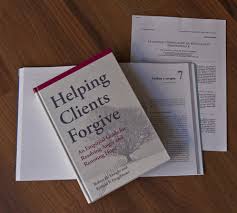Archive for November, 2014
Dr. Enright Forgiveness Workshop Now Online
NOTE: A videotaped recording of a webinar that Dr. Enright presented to members of the North American Association of Christians in Social Work (NACSW) in partnership with the Canadian Society for Spirituality and Social Work (CSSSW) is now available for viewing online. Here are the details:
Forgiveness: A Pathway to Emotional Healing
Based on his 25-years of peer-reviewed, empirical scientific research, Dr. Robert Enright will help you discover and learn a step-by-step pathway to forgiveness. This 4-hour online workshop will enable you to develop confidence in your forgiveness skills and learn how you can bring forgiveness to your family, school, work place and community for better emotional health.
“Forgiveness is a process, freely chosen, in which you willingly reduce resentment through some hard work and offer goodness of some kind toward the one who hurt you,” according to workshop presenter Dr. Enright. “This gives you a chance to live a life of love, compassion and joy.”
Dr. Enright explains during this workshop how you can learn and use that process to help yourself and others. He explains, for example that:
• Forgiveness is NOT reconciliation, forgetting, excusing or condoning.
• Forgiveness does not get rid of the injustice but the effects of the injustice.
• Forgiveness cuts across many different philosophies and religions.
• The benefits of forgiveness are significant: scientific analyses demonstrates that considerable emotional, relational, and even physical health benefits result from forgiving.
• The roadmap to forgiveness is the 20-Step Process Model of Forgiving developed by Dr. Enright.
• Once you’ve learned the forgiveness process, you can help create The Forgiving Community–bringing forgiveness to your family, your church, your clients and your community.
The content of this workshop will not only teach you about forgiveness but it also emphasizes the historical and current religious components of forgiveness.
NACSW (provider #1078) is approved as a provider for social work  continuing education by The Association of Social Work Boards (ASWB). Social Workers are eligible for 4.0 continuing education clock hour(s) for completing this training.
continuing education by The Association of Social Work Boards (ASWB). Social Workers are eligible for 4.0 continuing education clock hour(s) for completing this training.
Registration fee for this online workshop is $60 for NACSW and CSSSW members; $75 for non-members. Watch a video clip of the first six minutes of the workshop. Get all the details at the NACSW Online Continuing Education website.
“Helping Clients Forgive” – Our Online CE Course >Get Started Today
Psychologists and other helping professionals: enhance your professional expertise and capabilities by learning how forgiveness can help your clients and how you can apply the forgiveness process in your practice.
This CE course is based on the book: “Helping Clients Forgive: An Empirical Guide to Resolving Anger and Restoring Hope” by Dr. Robert Enright  and Dr. Richard Fitzgibbons. The course work includes the empirical foundations of forgiveness therapy, process models of forgiveness interventions, and the clinical application of forgiveness in a variety of clinical presentations such as depressive and anxiety disorders, substance abuse, eating disorders, marital and family adjustment disorders.
and Dr. Richard Fitzgibbons. The course work includes the empirical foundations of forgiveness therapy, process models of forgiveness interventions, and the clinical application of forgiveness in a variety of clinical presentations such as depressive and anxiety disorders, substance abuse, eating disorders, marital and family adjustment disorders.
The goal of the home study course is to provide professionals: 1) with an understanding of the empirical basis for forgiveness in therapy; 2) with a working knowledge of the psychological processes of forgiveness; 3) with an understanding of the relevance of forgiveness for many clinical presentations; and 4) with clinical expertise in applying the forgiveness process to his/her own practice.
All course work is offered online. The cost is $175.00. Licensed psychologists who successfully complete the course will receive 15 credit hours from the American Psychological Association (APA). Social workers in Wisconsin are also eligible for the 15 credit hours.
The faculty includes Dr. Robert Enright, Licensed Psychologist and Professor of Education Psychology, Dr. Elizabeth Gassin, Professor of Educational Psychology, and Dr. Catherine Coyle, Lecturer in Educational Psychology and Researcher. Each of these instructors has more than 20 years of experience researching and teaching about forgiveness. The following links will enable you to view the full CV of each of the faculty members: 1) Dr. Robert Enright; 2) Dr. Elizabeth Gassin; 3) Dr. Catherine Coyle.
This course was developed for Licensed Psychologists who are only now learning about the psychology of forgiveness as well as those  with intermediate and advanced knowledge in the area. It has also proven beneficial, however, for ministers, psychiatrists, social workers, nurses, and other professional counselors who have completed the course.
with intermediate and advanced knowledge in the area. It has also proven beneficial, however, for ministers, psychiatrists, social workers, nurses, and other professional counselors who have completed the course.
The International Forgiveness Institute is approved by the APA to sponsor continuing education for psychologists. The International Forgiveness Institute maintains responsibility for this program and its content.
4-Hour Online Forgiveness Workshop – Sign Up Now
Forgiveness: A Pathway to Emotional Healing
Based on his 25-years of peer-reviewed, empirical scientific research, Dr. Robert Enright will help you discover and learn a step-by-step pathway to forgiveness. This 4-hour online workshop will enable you to develop confidence in your forgiveness skills and learn how you can bring forgiveness to your family, school, work place and community for better emotional health.
“Forgiveness is a process, freely chosen, in which you willingly reduce resentment through some hard work and offer goodness of some kind toward the one who hurt you,” according to workshop presenter Dr. Enright. “This gives you a chance to live a life of love, compassion and joy.”
Dr. Enright explains during this workshop how you can learn and use that process to help yourself and others. He explains, for example that:
• Forgiveness is NOT reconciliation, forgetting, excusing or condoning.
• Forgiveness does not get rid of the injustice but the effects of the injustice.
• Forgiveness cuts across many different philosophies and religions.
• The benefits of forgiveness are significant: scientific analyses demonstrates that considerable emotional, relational, and even physical health benefits result from forgiving.
• The roadmap to forgiveness is the 20-Step Process Model of Forgiving developed by Dr. Enright.
• Once you’ve learned the forgiveness process, you can help create The Forgiving Community–bringing forgiveness to your family, your church, your clients and your community.
NOTE: This online workshop is a videotaped recording of a webinar that Dr. Enright presented to members of the North American Association of Christians in Social Work (NACSW) in partnership with the Canadian Society for Spirituality and Social Work (CSSSW). The content emphasizes the historical and current religious components of forgiveness.
NACSW (provider #1078) is approved as a provider for social work  continuing education by The Association of Social Work Boards (ASWB). Social Workers are eligible for 4.0 continuing education clock hour(s) for completing this training.
continuing education by The Association of Social Work Boards (ASWB). Social Workers are eligible for 4.0 continuing education clock hour(s) for completing this training.
Registration fee for this online workshop is $60 for NACSW and CSSSW members; $75 for non-members. Watch a video clip of the first six minutes of the workshop. Get all the details at the NACSW Online Continuing Education website.
United Nations Peace Conference Emphasizes Justice and Forgiveness
Today’s Zaman (an English-language daily newspaper in Istanbul, Turkey) – A United Nations peace conference held in Geneva, Switzerland, on United Nations Day (Oct. 24), developed “five tools as the modus operandi of peace building” including justice and forgiveness.
Although Islamic scholar Fethullah Gulen was unable to be at the conference with the more than 800 participants from 50 countries who attended, he sent a message that was read by German historian and author Jochen Thies. In his message, Gülen emphasized the importance of investing in human beings while stating that “building peace means building peace-loving men and women.”
Professor Thomas Michel of Georgetown University (Washington, DC), was one of the conference speakers who underlined the importance of justice and forgiveness as tools to achieve peace. He said one is not possible without the other and that without serving justice no forgiveness should be expected from the victims of oppressors. According to Michel, the way to make people forgive their oppressors is to increase dialogue among groups with animosity against each other.
After day-long intensive workgroup meetings, the conference suggested five tools as the modus operandi of peace building: interfaith dialogue, justice and forgiveness, education (especially to foster intercultural understanding), forming institutions to promote peace, and for peace speech to replace the hate speech that is prevalent, especially in social media.
Just three weeks prior to the Geneva conference, University of Wisconsin educational psychology professor Dr. Robert Enright laid the foundation for “forgiveness as a peace tool” at a 2-day work session hosted by the United Nations Population Fund (UNFPA). Professor Enright, co-founder of the International Forgiveness Institute, served on an international “Expert Group” that is developing intervention models aimed at ending gender-based violence around the world.
Globally, according to the UNFPA, 1 in 3 women face gender-based violence, usually at the hands of someone she knows. Furthermore, 1 in 4 women, including adolescent girls, have been subjected to intimate partner or non-partner sexual violence. Those risks of violence are compounded in countries experiencing conflict and are negatively impacting broader peace initiatives in those countries.
Dr. Enright said he is hopeful that the forgiveness programs he has been operating in Northern Ireland for the past 12 years; in Liberia, West Africa for 3 years; and the one he just recently started in Israel-Palestine after 3 years of groundwork there, will soon be employed around the world to address violence and peace issues.
“If students are introduced at age 4 to the inherent (built-in) worth of all people, which we do in our Forgiveness Education Programs, would the amount of violence go down, perhaps dramatically, and would that increase the likelihood of peace?” Dr. Enright asks. ”The world needs forgiveness education.”
Are forgiveness and trust the same?
Forgiveness and trust differ. Forgiveness as an act of mercy toward an offender can be offered unconditionally. Trust needs to be earned if the offense is deeply serious. Forgiveness is a moral virtue. Trust accompanies reconciliation, which is not a moral virtue but instead is a negotiation strategy between two or more people. Finally, you can forgive without trusting the other, at least in those areas of his or her weakness. For example, you can forgive a compulsive gambler and watch your wallet.



